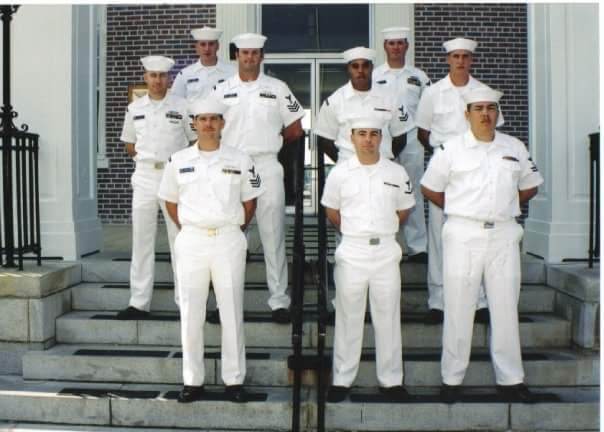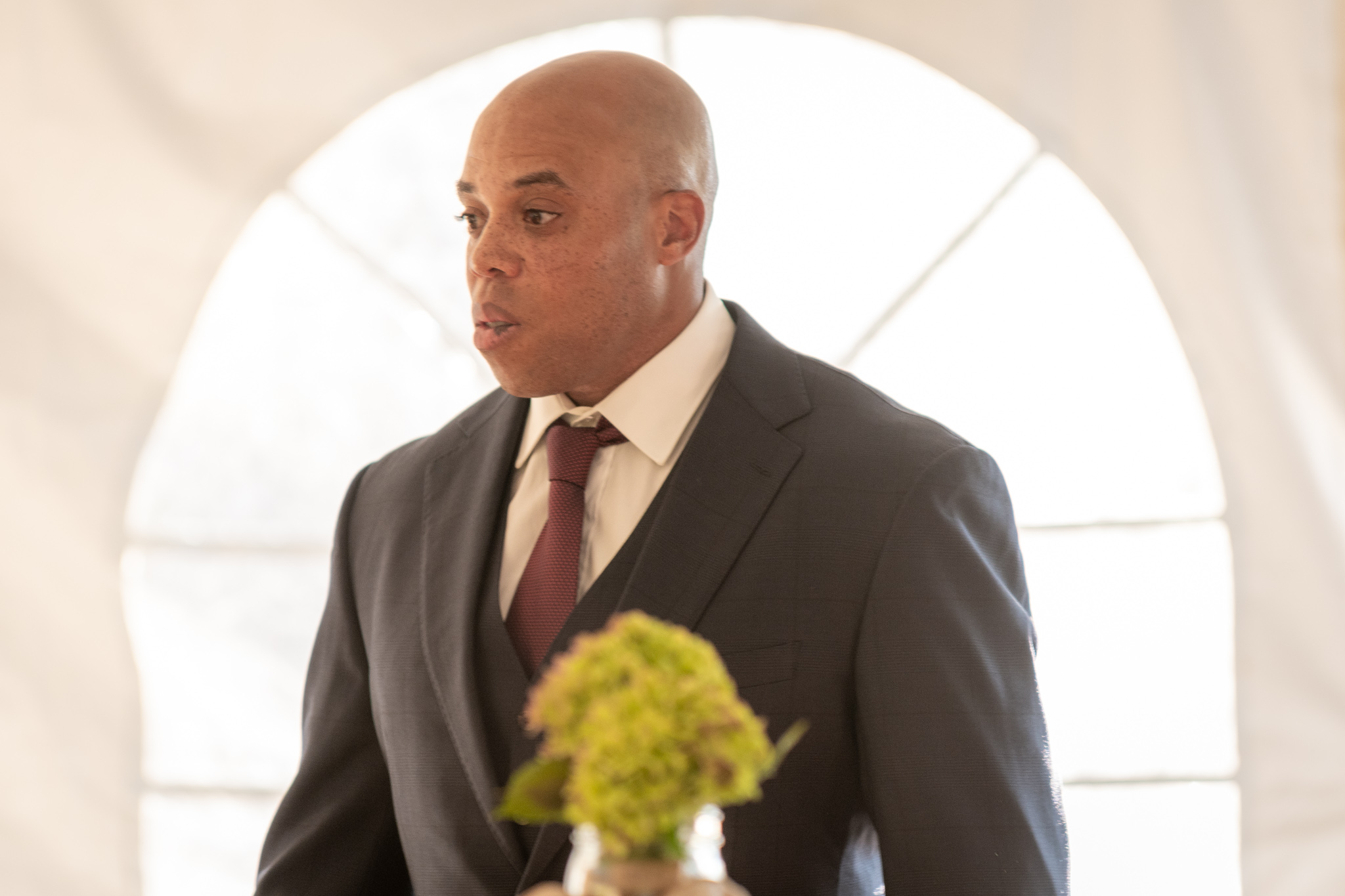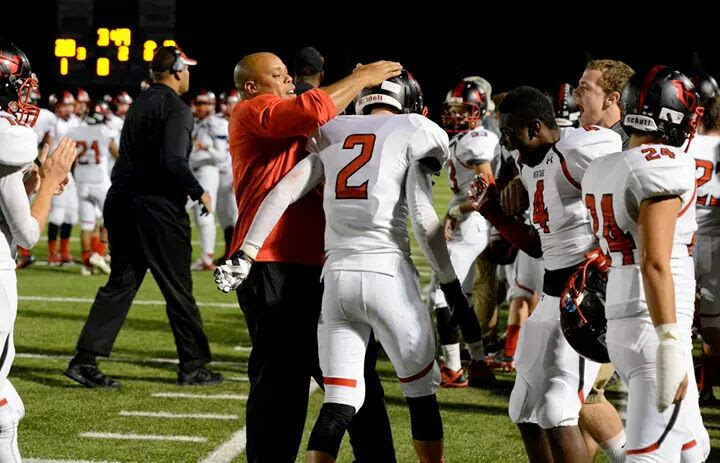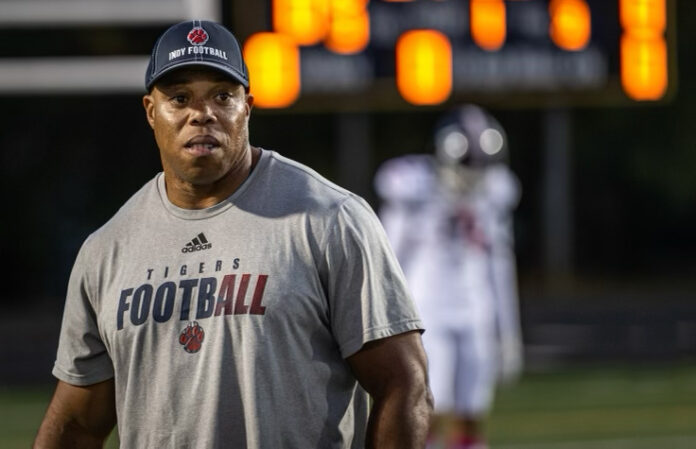Carnadi Ford is a 10-year veteran of the U.S. Navy as a Cryptologic Technician Maintenance (CTM) in the Navy Security Group Activity (NSGA) community. He was a part of several missions in support of Operation Enduring Freedom and Operation Iraqi Freedom. After leaving the Navy, Carnadi worked as a Test & Evaluation Engineer for Argon ST supporting their submarine programs. Currently he works as an Export Compliance Engineer for Boeing supporting their Autonomous System programs.
Carnadi has spent 5 years as the head strength & conditioning coach, assistant football coach and FCA ( Fellowship of Christian Athletes ) character coach at Heritage High School. He has spent the last 4 years in the same roles at Independence High School. His passion is working with the youth on the football field and in the weight room. Carnadi spends most of his free time mentoring many of the athletes that he works with. He not only mentors his former athletes, but continues to mentor many of his former athletes in college and beyond.
When he isn’t training athletes in the weight room, coaching football players on the football field, or mentoring young men, he is working in support of his wife’s nonprofit, BetterALife where they feed and provide assistance to local families in need. Carnadi is married to Elizabeth Ford and they are a blended family with 7 children. Check out our interview with him below, SALUTE!
How long were you in the Navy and why was your military service traumatic for you?
I joined the Navy in June of 1997, 7 days after I graduated high school and stayed for 10 years. I had wanted to join the Navy since I was 13. Even though I took part in several missions in the Middle East after 9/11, my trauma did not come from my time in the Middle East. My trauma developed from all the travel that my job required. I traveled so much that I missed my kids being born, birthdays, holidays, first days of school, sports, and so much more. I missed my kids growing up during some of their most impressionable years. I left the Navy that I loved to try to save my family, but a few months after I left, my wife left me because I was always gone. When my wife left me, my kids wanted nothing to do with me and easily believed the lies that were told about me. They moved with her to Florida and I didn’t hear from them for years. I had lost my family, my kids, and the Navy. I felt like a failure in all areas of my life and fell into a deep depression.

You were never checked for PTSD after being done with your Navy service, but you had a lot of family issues and were dealing with depression. What was that like for you?
I was never checked for PTSD neither after I left the Navy nor anytime during my time in the Navy. I got very good at hiding the trauma that I was dealing with. I truly don’t believe that anyone that I was stationed with knew what I was dealing with. It is a very lonely place when you struggle with trauma on your own. I know I wasn’t the only one trying to manage my trauma, but I believe we all get good at hiding our trauma. During Boulder Crest Foundation’s Warrior PATHH program, they pointed out that this is part of our training, to push through those emotions to get the job done.
How did you learn about the Warrior PATHH program at Boulder Crest Foundation and why did you decide to apply?
How I came across Boulder Crest Foundation was a complete coincidence. A family friend had purchased tickets for their annual Gala and was unable to go, so they offered my new wife and I the tickets. I had to look up what Boulder Crest was because I had never heard of the organization before. During the Gala I talked to several veterans who had been through the program and one specific one at our table could tell I needed Warriors PATHH even though at the time I didn’t feel like I did. As my wife and I left the Gala, I felt as if a bandage had been ripped off and some of those feelings and emotions I had buried for so long started to come up. These emotions nagged me for weeks until I finally reluctantly decided to apply to the Warrior PATTH program, which is cost-free because of the donations made to the Boulder Crest Foundation.
What were some of the most impactful experiences during the program?
The one of the most impactful experiences for me was when we walked the Labyrinth. To the casual observers, it just looks like a cool pattern of rocks on the ground. To me, the Labyrinth is where I took off all the emotional baggage I had been carrying for over a decade and left it. Words truly cannot describe how going through the Labyrinth while holding a boulder felt for me. I remember physically shaking and sobbing as I walked through it with my fellow participants.
What would you tell fellow military members who are suffering about managing their mental health?
What I would tell my military brothers and sisters who are suffering with their mental health is that they are not alone and that there are veterans who have been through similar situations who are desiring help. That is the best thing about Warrior PATHH, it is run by veterans and first responders who have been through the program. We don’t go to war alone, so why battle our trauma alone? We might find a way to win a few battles on our own, but we will never win the war alone. Everyone deserves help — whether you were on the front lines or behind a desk. Trauma is trauma.

What advice do you have for black men struggling with their mental health? and why is it important for us as black men to have healthy coping mechanisms?
As a black man, it is hard for us to admit that we need help with our mental health. When we do, we are seen as weak. However, it takes courage to admit that we need help. It takes more courage to face our demons than to run from them and hide them. And we can only successfully face them if we have healthy coping mechanisms. Without healthy coping mechanisms we could easily push away the people we love or unsuccessfully try to cope with drugs or alcohol. Even worse, like many veterans, it could push you over the edge to suicide.
How does weight lifting support your mental health?
Weight lifting has become a coping mechanism for me in dealing with my mental health for a couple of main reasons. For one, I deal with a lot of self-confidence issues and I’ve gotten really strong in the weight room, and that has become one place where I have confidence and don’t often feel like a failure. Secondly, in the weight room, I can be alone with my thoughts and emotions. That is where I battle my negative thoughts and emotions as I push through the pain of my lifts. Every lift session for me is like a therapy session. I started taking weight lifting seriously about a year after bootcamp. I didn’t realize it when I started, but it became a coping mechanism for a lot of the internal struggles I was dealing with. While going through the Warrior PATHH program, our Guides gave us specific practices to help us with our Posttraumatic Growth (PTG), which basically teaches us what doesn’t kill us makes us stronger. One of those practices we learned was physical fitness. While attending Warrior PATHH we used the TRX for our physical fitness practice.

You are a football and strength training coach for high school students, how do you support your student’s mental health through fitness?
With being not only a football coach, but the strength coach for my players, I have the opportunity to be with them all year round. I use the weight room to connect with my athletes and talk to them about things other than the weight room or football. I get to know the person and not just the athlete. Through those conversations I am able to find out what type of home life they have, where their struggles are, what their needs are, and where they need encouragement. Then I make sure to check on as many as possible on a regular basis. Often my former students who became athletes in college and have gone on to work on their careers after graduation still contact me. They still ask me for advice. Actually, just today one of my former athletes who recently graduated college asked me to meet him in the local gym for a workout where we spent 2 hours catching up with one another. I have also had the opportunity to use a lot of what I’ve learned at Warrior PATHH in mentoring my current and former athletes.
Do you consider yourself a father-figure to the kids that you coach? If so, how does that make you feel?
I don’t just feel like a father-figure to my athletes, they tell me all the time that I am like a father to them. Even their parents have told me that I’m like a second dad to their sons. The feeling I get every time an athlete tells me that they love me or invites me to their college graduation, or just calls me out of the blue to talk is indescribable. When I did Warrior PATHH, I learned about the process and outcome of Posttraumatic Growth. One of the outcomes of PTG is wanting to give back to your community through service. Everything I do for the football team is in a volunteer role and so those instances are what makes all the time I spend at the school worth it. I truly believe this is my purpose in life, to mentor our youth and help them reach their full potential. To help them develop into good husbands, fathers, and citizens.
How can people learn more about the program and where can people follow you moving forward?
To learn more about Boulder Crest Foundation and the Warrior PATHH program please go to their website at https://bouldercrest.org. If you have further questions about my experiences at Boulder Crest or want to follow my progress, you can find me on any of these platforms





